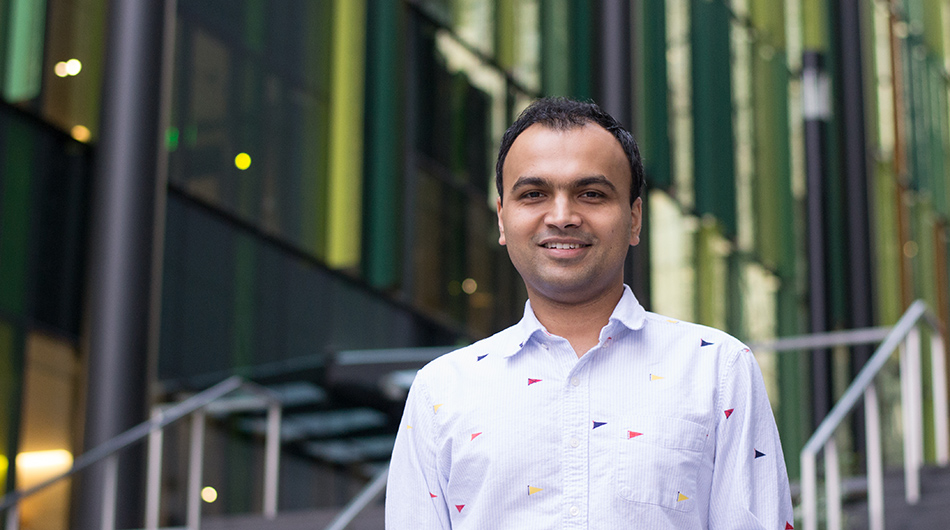In America, an Amazon survey may ask if your online experience was “frustration free.” That works here, says Akshay Bhagwatwar. People get it. But travel halfway around the world and the reaction may be puzzlement. "‘Frustration’ has different meanings in different countries,” says the iSchool alum, who is analytics leader on an Amazon customer experience team that develops tools to gather and analyze individual feedback worldwide.
In another culture, Bhagwatwar points out, the word “frustration” might be used in dire situations, like a family tragedy. “You would never say that word in the context of using a website.” The fix, he says, may be as simple as translating “frustration free” to “easy to use.”
Understanding such subtle nuances is critical to the work of the 2-year-old global CX (customer experience) team, which is already spread from Europe and Costa Rica to China, India, and Japan. CX team members are learning to take their cues from local culture as they seek the feedback used to improve Amazon services. “You have to find the right way to ask people questions, find the right way to frame the questions, and make sure they are communicated to people in the right way,” says Bhagwatwar, who graduated from the iSchool’s Master of Science in Information Management program in 2010. “You need the right listening mechanisms for people everywhere.”
Bhagwatwar came to the iSchool — and to America — from India, where he completed his bachelor’s degree in engineering and information technology at the University of Mumbai in 2008. There were very few information schools in India at the time, so he looked overseas. He liked the iSchool’s high ratings and — coming from a highly technical background — he liked the human-centered focus of the school. “I wanted to learn the people aspect, the social aspect of how technology affects people and how people affect technology,” says Bhagwatwar, who quickly dove into classes on user interaction and user-centered development of technology.
His favorite memory from the program is working one-on-one with iSchool professors on research projects. His teachers were always accessible and open to collaboration, he says. “The idea for me was to get a piece of what these professors worked on and really understand what I could learn from them.”
During his last year in the MSIM program, he was hired as the first intern at Annie Searle & Associates (ASA), a risk consulting and research firm in Seattle. “I was impressed by his seriousness and his extreme professionalism,” says the firm’s principal Annie Searle, now a lecturer at the iSchool.
Bhagwatwar quickly went to work. “He started by doing research and writing research notes for the company in September and early October, and by the end of October he had designed the company’s first newsletter. We’ve never changed the template since,” says Searle.
“He never delivered anything light, and he was always on time,” she adds.
Searle has kept in touch with Bhagwatwar over the years and recently invited him to guest lecture in her ethics and policy in information management course at the school. “I knew from the quality of his writing that he’d be of interest for the students to hear. I was thrilled to have him.”

Having had a taste of the academic life working with iSchool researchers, Bhagwatwar decided to become part of that life. He received his Ph.D. from the Kelly School of Business at Indiana University and worked there as a lecturer until 2015. He moved onto Northern Illinois University in the role of professor of operations management and information systems.
Bhagwatwar found the professorial role gratifying. He liked the research, and, over the years of study and work, co-wrote numerous scholarly articles covering everything from the power of participatory citizen platforms to compensation of IT service management. Most of all, though, he liked engaging with students.
“The students are, to be honest, much more ahead of you on technology,” says Bhagwatwar, who earned many top teaching honors for his work in the classroom. “They’re the next generation. And when I’m in the classroom I’m so excited to hear what they think about technology and how their lives would change using the platforms they use.”
Then, last year, the corporate world came calling. Recruiters had discovered Bhagwatwar’s wealth of research papers online, including fresh examinations of topics such as team collaboration and innovative group thinking. In the papers, the prolific researcher explored ideas such as boosting creativity with electronic brainstorming and using 3-D virtual environments in support of collaboration – putting people in the same space, wherever they were, via technology.
“I’m in touch with people in every part of the world. I may not see them for months. But that physical distance between us should not matter, should not be a roadblock for us collaborating and coming up with ideas,” says Bhagwatwar.
He started his new job on Amazon’s South Lake Union campus in August. In the months since, he and his team have been constantly developing and refining tools to better listen to individuals across the globe. Bhagwatwar uses state-of-the-art technology to sort through all the mountains of feedback data that result, always on the lookout for what he calls “the hidden insights.”
“We have so many individuals giving us feedback all the time that it’s often difficult, in all that data, to find the valuable things that can really drive business decisions and improvement,” he says.
When not at work or writing research papers off-hours, Bhagwatwar enjoys hiking in the mountains, taking pictures of landscapes, and playing board games with his wife and friends. These are old-fashioned, unplugged, physical board games: Monopoly, Scrabble, and chess, a game he first played as a child in India. “Once outside of work, I want to stay away from a screen for a few hours,” he says.
Bhagwatwar calls the switch from the academic to the corporate world “interesting.”
“It’s a really different world in corporate, where things move month to month. In academia, things move semester by semester, or year by year. And, as a professor, you have more control of your schedule: I do the research work I want to do, teach the courses I want to teach, with the contents I want to teach. When you are in a corporate environment, you do the things the company wants you to do.”
But he finds the challenges of his new environment exciting. “It’s fun, working in a company that moves as fast as Amazon.”
He describes his basic role there as “a communicator between global customer feedback and Amazon services” — a crucial role as the company expands to untapped markets around the world. “This exact piece is what the Information School MSIM program teaches you: to be that liaison, that communicator who can really understand a person’s needs and translate that into something more technical,” he says.
“People don’t often express their needs and wants in technical language. The iSchool teaches you how to be able to convert that.”
He has used those skills to help other companies, too. When customers’ credit cards were hacked at Home Depot and Target several years ago, Bhagwatwar worked with their headquarters to optimize social media platforms for communicating information about the hack and listening to customers’ concerns.
It’s all about communication, he says. “You cannot have a successful 21st-century firm that does not engage with its own customer.”
